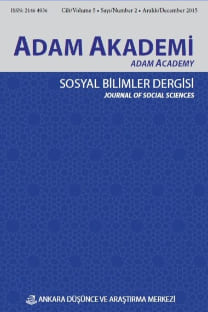Bosnalı Öğrencilerin Türkiye ve Türk Kültürü Algısı
Kamuoyu Algısı, Bosna-Hersek, Türkiye, Balkanlar
Perceptions of Bosnian Students’ of Turkey and Turkish Culture
Public Perceptions, Bosnia and Herzegovina, Turkey, Balkans,
___
- Aydos, S. (2017). Popular Culture and National Identity: A Study on University Students in Bosnia and Herzegovina Who Are “The Magnificent Century” Viewers. Series - International Journal of TV Serial Narratives, 3(2), 63–75. https://doi.org/10.6092/issn.2421-454X/7629
- Bechev, D. (2012). Turkey in the Balkans: Taking a Broader View, Insight Turkey, 14 (1), 131-146.
- Benjamin, B. & Bernard, L. (1982). Chrisitans and the Jews in the Ottoman Empire: The Central Lands (Volume 1). New York: Holmes & Meier Publishers.
- Berg, M. (2017). The importance of cultural proximity in the success of Turkish dramas in Qatar. International Journal of Communication, 11, 3415–3430.
- Bilgiç, M. S. & Akyürek, S. (2012). Balkanlarda Türkiye ve Türk Algısı, Rapor No:49, Ankara: Bilgesam Yayınları.
- Bojić, M. (2001). Historija Bosne i Bošnjaka (History of Bosnia and Bosniaks). Sarajevo: Šahinpašić.
- Bozkuş, Y. D. & Arı, E. B. (2019). Southern Caucasian Students’ Perceptions of Turkey and Turkish People, Ankara Üniversitesi Çevrebilimleri Dergisi, 7(2), 106-124.
- Bugajski, J. (2012). Turkey’s Impact in the Western Balkans, Atlantic Council, February, 1-5.
- Burg, S. L. & Shoup, P. S. (1999). The War in Bosnia: Ethnic Conflict and International Intervention. New York: M.E. Sharpe.
- Ćorović, V. (2005). Ilustrovana istorija Srba (Illustrated History of Serbs). Beograd: Politika-Narodna Knjiga.
- Davutoglu, A. (2010). Turkey’s zero-problems foreign policy. Foreign Policy, 20 May 2010.
- Dursun-Özkanca, O. (2019). The Western Balkans in the Transatlantic Security Context: Where Do We Go from Here? Insight Turkey, 21(2), 106-128.
- Filandra, Š. (1998). Bošnjačka politika u XX. stoljeću (Bosniak Politics in the XX Century). Sarajevo: Sejtarija.
- Friedman, F. (2004). Bosnia: A Polity on the Brink. London: Routledge.
- Gültekin, B. (2005). Türkiye’nin Uluslararası İmajında Yükselen Değerler ve Eğilimler, Selçuk İletişim: 4(1);126-140.
- Gündüz, T. (2016). Alahimanet Bosno: migracija Bošnjaka na teritoriju Osmanskog carstva 1879-1912 (Alahimanet Bosnia: Migration of Bosniaks to the Territory of the Ottoman Empire 1879-1912). Istanbul: Yeditepe.
- Hoxha, E. (2018a). Turkey vs. China: Assessing Perceptions of the Economic, Political and Cultural Influence in Albania, European Journal of Social Sciences, 1(3), 7-13.
- Hoxha, E. (2018b). The Economic, Political and Socio-Cultural Influence of Turkey and Russia in Albania: Perceptions from Youth Political Forums, European Journal of Social Sciences, 1(3), 14-20.
- Imamović, M. (1997). Historija Bošnjaka (History of Bosniaks). Sarajevo: Preporod.
- Imamović, M. (2006). Bosnia: Evolution of its Political and Legal Institutions. Sarajevo: Magistrat.
- Işık, H. (2016). The views of Arab students regarding Turks, The Ottoman Empire, and The Republic of Turkey: A case of Jordan. Educational Research and Reviews, 11(7), 377-389.
- Karčić, F. (1999). The Bosniaks and the Challenges of Modernity: Late Ottomand and Hapsburg Times. Sarajevo: El-Kalem.
- Kirişçi, K. (2009). “The Transformation of Turkish foreign policy: The Rise of the Trading State”, New Perspectives on Turkey, 40, 29-57.
- LeBor, A. (2004). Milošević: A Biography. New Haven: Yale University Press.
- Mulalic M. & Kulanic, A. (2016). “Perceptions of Turkish Cultural Diplomacy in Bosnia and Herzegovina,” in Muhidin Mulalic, Nudzejma Obralic, Almasa Mulalic, and Emina Jeleskovic, (eds.), Education, Culture and Identity: The Future of Humanities, Education and Creative Industries, Sarajevo, 494-508.
- Nuroğlu, E. (2013). Dizi Turizmi: Orta Doğu ve Balkanlar’dan Gelen Turistlerin Türkiye’yi Ziyaret Kararında Türk Dizileri Ne Kadar Etkili. Uluslararası İstanbul İktisatçılar Zirvesi, Küresel ve Bölgesel Değişim Sürecinde Yeni Türkiye’nin Ekonomik Vizyonu, 1-13.
- Pajaziti, A. (2011). "Turk and Turkey perception at Albanians in the beginning of 21st century", Past, Present and Future of Turkish-Albanian-Macedonian Relations, International Symposium, Skopje, Macedonia-Prishtinë, Kosovo. Ankara Center for Thought and Research & International Balkan University.
- Pejanović, Đ. (1955). Stanovništvo BiH (Population of Bosnia and Herzegovina). Beograd: SAN.
- Rašidagić, E. K. (2013). A Critical Analysis of Turkish Foreign Policy towards the Western Balkans, in Turkish-Balkans Relations: The Future Prospects of Cultural, Political and Economic Transformation. Eds. Mulalić, Muhidin. Korkut, Hasan. and Nuroglu, Elif. Istanbul: Tasam.
- Sell, L. (2002). Slobodan Milošević and the Destruction of Yugoslavia. Durham: Duke University Press.
- Uçak, S. (2017). Irak’ta yabancı dil olarak Türkçe öğrenen öğrencilerin Türkiye, Türkler ve Türkçe algısı. Turkish Studies. 12 (14), 491-512.
- United Nations Security Council Resolution, (A/RES/46/237). Available at: https://undocs.org/A/RES/46/237, accessed on June, 18, 2021.
- Yiğit, M . (2021). Saraybosna Yunus Emre Enstitüsündeki Kursiyerlerin Türkiye Algisi ve Türkçe Öğrenme Sebepleri, Kırıkkale Üniversitesi Sosyal Bilimler Dergisi , 11 (1) , 207-216.
- Zhumabaeva, A., Nurmukhan, A. & Jin, Z. W. (2019). Nation branding – case study of Turkey, Akademia Zarządzania, 3(2), 124-135.
- ISSN: 2146-4936
- Yayın Aralığı: Yıllık
- Başlangıç: 2011
- Yayıncı: Ankara Düşünce ve Araştırma Merkezi İktisadi İşletmesi
Mervan SELÇUK, Şakir GÖRMÜŞ, Murat GÜVEN
Osmanlı İstanbul’unda Sahne Sanatları ve Sinema Gösterimlerinin Vergilendirilmesi (1908-1914)
Jeremy Black Savaş ve Teknoloji
Kamu Çalışanlarının Kariyer Memnuniyetlerinin İş Doyumu Üzerine Etkisi
Göç ve Kente Uyum Süreçlerinde Madde Kullanan Ergenlerin Bağımlılık Tipolojileri
Ulus İnşası Sürecinde Ayrılıkçılık Hareketi: Çeçen ve Açe Örneği
Amerikan Dış Politikasında Bir Süreklilik Unsuru: Liberal Değerlerin Yayılması ve Savunulması
Osmanlı İstanbul’unda Sahne Sanatları ve Sinema Gösterimlerinin Vergilendirilmesi (1908-1914)
Kuşaklararası Manevi Güçlenme Eğitimi Programı İlkokul 4. Sınıf Öğrencileri ile Uygulama Örneği
Yeni Toplumsal Hareketler Bağlamında Black Lives Matter (BLM) Örneği
